The Cancer Experience
The Cancer Experience
The Doctor, the Patient, the Journey
Roy B. Sessions
ROWMAN & LITTLEFIELD PUBLISHERS, INC.
Lanham Boulder New York Toronto Plymouth, UK
Published by Rowman & Littlefield Publishers, Inc.
A wholly owned subsidiary of The Rowman & Littlefield Publishing Group, Inc.
4501 Forbes Boulevard, Suite 200, Lanham, Maryland 20706
http://www.rowmanlittlefield.com
Estover Road, Plymouth PL6 7PY, United Kingdom
Copyright 2012 by Rowman & Littlefield Publishers, Inc.
All rights reserved . No part of this book may be reproduced in any form or by any electronic or mechanical means, including information storage and retrieval systems, without written permission from the publisher, except by a reviewer who may quote passages in a review.
British Library Cataloguing in Publication Information Available
Library of Congress Cataloging-in-Publication Data
Sessions, Roy B.
The cancer experience : the doctor, the patient, the journey / Roy B. Sessions.
p. cm.
ISBN 978-1-4422-1621-1 (cloth : alk. paper) ISBN 978-1-4422-1623-5 (ebook)
1. CancerPsychological aspects. 2. CancerPatientsCareMoral and ethical
aspects. I. Title.
RC263.S445 2012
616.99'4dc23 2011047812
 The paper used in this publication meets the minimum requirements of American National Standard for Information SciencesPermanence of Paper for Printed Library Materials, ANSI/NISO Z39.48-1992.
The paper used in this publication meets the minimum requirements of American National Standard for Information SciencesPermanence of Paper for Printed Library Materials, ANSI/NISO Z39.48-1992.
Printed in the United States of America
Dedicated to those brave patients who have taken The Journey .
Authors Note on Terminology
I have taken the liberty of using certain words interchangeably, not to invite inconsistency, but to add variability to the text. The words physician and doctor are used almost interchangeably , with the exception being that those of our colleagues who have graduated from schools of osteopathy, have the designated degree of doctors of osteopathy (DO) and are referred to as doctor but not physician. Those who have graduated from medical schools receive an MD, and are called either doctor or physician. In this text, therefore, a referring doctor can be either a doctor of osteopathy or a medical doctor, that is, a physician.
The words oncologist , cancer physician , and cancer doctor all denote medical doctors with a particular focus or special training in the management of tumors, benign as well as malignant. The word oncologist is generic, and can refer to a surgical oncologist, a radiation oncologist, a medical oncologist, or a psycho-oncologist. Surgical oncologists are further subdivided, but because this book concerns cancer in general those distinctions are not relevant here. Suffice it to say that in all of the surgical oncology specialties there is the commonality of interest in and focus on cancer, usually to the exclusion of other diseases of the various body systems. Thus, the word oncology is used throughout the book in a generic way. Medical oncologists are sometimes referred to as chemotherapists.
Finally, the words cancer and malignancy are the same, while tumor is a general word that includes both benign and malignant growths.
Foreword
N o medical diagnosis is more fearsome than the diagnosis of cancer. The very mention of the word is enough to trigger a confluence of physical, emotional, spiritual, and financial crises. The resulting maelstrom of life-changing events engulfs patients, their families, and their doctors. If the cancer involves the head and neck, fear of physical disfigurement augments the patients dread of alienation from the world of purposeful existence.
In this book, Dr. Roy Sessions reflects on his life as a dedicated head and neck surgeon living daily within the disrupting milieu of his patients cancer. He describes how cancer confronted and challenged his own technical and personal resources as a professed healer. Sometimes he cured, sometimes ameliorated or palliated. All too often, he traveled with his patient along the path of human finitude to the patients death.
Repeatedly, Sessions recognizes the need to join surgical and medical competence with the capacity to enter into the patients real-world predicament, and for this a strong bond of trust is essential. He laments the weakening of trust between physicians and patients in the contemporary world. Without trust it is difficult for a physician to be healer, helper, and friend. Without trust it is difficult to sustain patient and doctor in their journey through the cancer experience.
Sessions lays a good part of the responsibility to build the requisite trust on the physician. To be authentic this trust must proceed from the physicians personal dedication to the primacy of the patients welfare. To be authentic this trust must rest on a moral commitment. Dr. Sessions outlines his own moral commitment in terms of the traditional Hippocratic ethic. Thus he expresses unapologetic opposition to inducing the death of patients. For him the legalization of assisted suicide is the dark side of end-of-life care in patients with cancer. There is a fine line between a physician helping a patient die and actually inducing death. He fears that the growing economic strictures on the care of dying patients will hasten the push to death in cancer victims.
This is a book replete with clinical wisdom earned through the authors dedication to the care of some of medicines most desperately ill patients. It will be of interest and instructional value to medical students, aspiring and practicing oncologistsmedical, surgical, radiationas well as physicians generally. But Sessions intends his book for the general public as well. Importantly, he makes the case that a better understanding of doctors by patients and their families is beneficial for all concerned. The cases Sessions describe will resonate with our own experiences or those of our families and friends. His thoughts extend well beyond the cancer experience to include other serious life-threatening trauma and illness.
Some may disagree with the authors firm adhesion to the traditional norms of professional ethics. Few however can deny the moral nature of medical practice for anyone who professes to be a healer. Medical students, those physicians in utero, should ponder the authors unrelenting moral commitment to the patients welfare. As we approach the revolutionary changes now occurring in the way we care for patients, we need to be reminded that all our efforts must finally be channeled toward the help and relief of a human in distress. Anyone who professes to possess the requisite knowledge to heal must use it to the advantage of the one who seeks and needs it.
The final common pathway of the doctors effort is the good of the patient. This is its moral lever. Current proposals for evidence-based, personalized, value-based, or systems care must traverse this ancient pathway if it is to be morally justified. The sick will always need physicians who practice technically correct, humanely administered, and morally guided personal care. Sessionss book provides the compass that must not be lost in the current zeal for change in how physicians and society care for the sick, the most vulnerable of our fellow citizens.
Edmund D. Pellegrino, MD, MACP
Professor Emeritus of Medicine and Medical Ethics, Georgetown University
and Interim Director, Center for Clinical Bioethics,
Georgetown University Medical Center
Acknowledgments
I n developing this book, I attempted to address both the medical and lay public by finding a lexicon that both camps would be comfortable with. In seeking this balance, it was difficult to avoid the inadvertent tilt toward what was comfortable and familiarin my case toward the world of the cancer caregivers. Realizing this natural tendency prompted me to field test the preliminary manuscript on nonmedical people, several of whom had been cancer patients, and who happened to be educated and critical individuals.

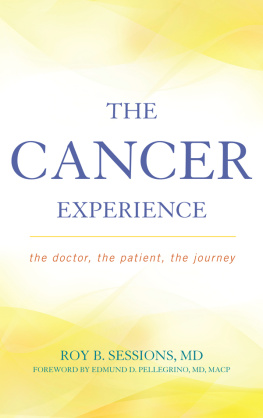
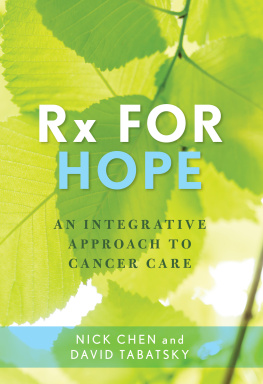
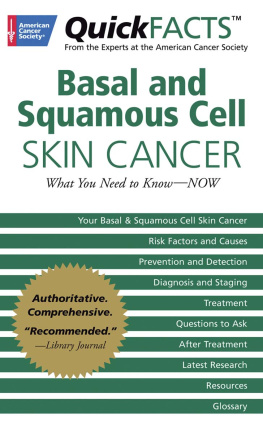
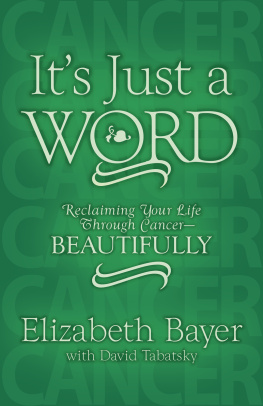
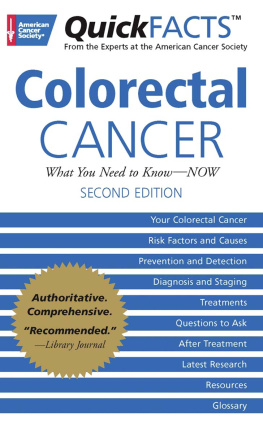
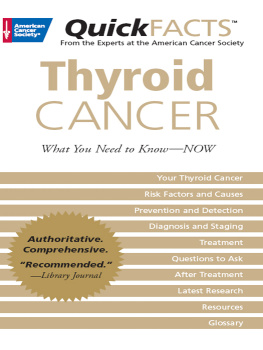
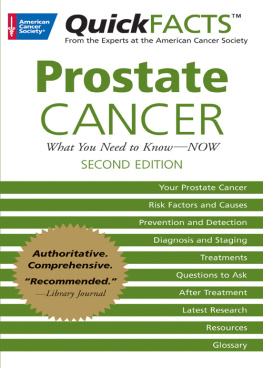
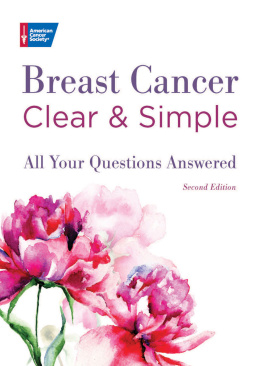
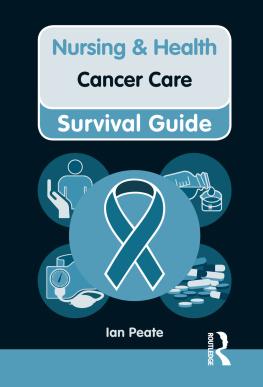

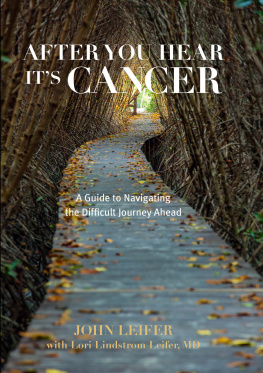
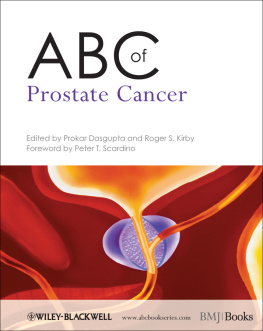
 The paper used in this publication meets the minimum requirements of American National Standard for Information SciencesPermanence of Paper for Printed Library Materials, ANSI/NISO Z39.48-1992.
The paper used in this publication meets the minimum requirements of American National Standard for Information SciencesPermanence of Paper for Printed Library Materials, ANSI/NISO Z39.48-1992.